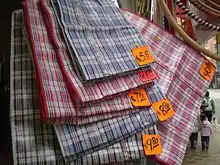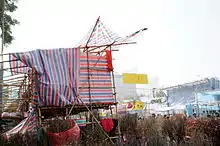Red-white-blue bag
Red-white-blue bag (Chinese: 紅白藍膠袋; Jyutping: hung4 baak6 laam4 gaau1 doi2) or laundry bag is a carriage bag made out of nylon canvas in colors of red, white and blue. It originated in Hong Kong in the 1960s and has become a representative of Hong Kong culture. Because the nylon canvas is known of its light, firmness and durable usage, it is commonly used as hand carry luggage and transport between Mainland China and Hong Kong.[1]

History
The Red-White-Blue was made by nylon canvas, which was invented by Japan, then exported to Taiwan and eventually come to Hong Kong. The canvas was originally used as the shelter for construction sites, temporary roof in squatter areas, and as protection for farmland.[1] It was presented as bags since 1960s by a tailor Lee Wah, who created the bag by the canvas from a Taiwan company.[2] There were only blue and white in the first place, red color was added to the fabric to represent lucky and fortune in its color combination.
These days the Red-White-Blue bag is made of plastic woven fabric, from either polyethylene (PE) or polypropylene (PP). And there are different colors appearing in the market, such as black, green and orange.[1]
Material and structure
Material for making the bags is mainly the polyethylene.[1] This fabrics are being knitted horizontally and vertically, and it is tightly knitted to create characteristics of being windproof and waterproof. Although the fabric is highly durable, the zippers easily break.[3]
Culture

After the transfer of sovereignty of Hong Kong, Red-White-Blue bag has been part of Hong Kongers' collective memory and used to represent some of Hong Kong's core values and beliefs. It is believed to be a material that express the localness of Hong Kong, because the bags have been very popular in Hong Kong since the 1950s.[3]
The material has been used to represent the industrious life of Hong Kong people in the 1950s and 1960s. Despite the cheapness of the material, it is very adaptable and durable to different scenarios as it was used for weatherproofing in the 1950s. The adaptable feature of the bag also symbolised Hong Kong people's resilient spirit and hardship.[3][4]
Artist Stanley Wong began the Red White Blue artwork series in 2001,[1] culminating in an exhibition in the Hong Kong Heritage Museum in 2004-5 which was said to have set the tone of subsequent discourse in the use of the red-white-blue motif in Hong Kong public art.[3]
Sam Hui, a Hong Kong Cantopop musician and songwriter, who is famous for performing Cantonese songs that relates to Hong Kong's lifestyle and culture, wore a red-white-blue costumes to symbolize the Red-White-Blue bags and the Hong Kong spirit during his concert in 2004.[5]
In 2006, Louis Vuitton adapted the Red-White-Blue-bag and redesigned into handbags with their logos printed on it. Although the designer of the bag claimed that the use of color is to represent the national flag of France, the bags immediately received favorable reviews for its showing of cheapness.[6] Chinese critics considered the bag a failed attempt to convert their “rural worker’s bag” to high culture.[3]
Hong Kong lifestyle design and retail brand company Goods of Desire (G.O.D.) remodelled the red-white-blue bags and adapted the color design to their products targeting the younger generation. It later became a fashionable icon in popular culture and further reinforce the core value, design and meanings of R-W-B to Hong Kong’s youth generation.[3]
See also
References
- "About rwb". rwb330. Retrieved 3 April 2014.
- "集體回憶袋袋相傳 紅白藍之父 李華". 明報. 20 April 2007. Archived from the original on 15 January 2008. Retrieved 3 April 2014.CS1 maint: bot: original URL status unknown (link)
- Liu, Nga Ying. "Red-White-Blue and Hong Kong Installation Art". Lingnan University. Retrieved 3 April 2014.
- "黄炳培:红白蓝象征香港时代精神". 联合早报网. 2013-10-08. Retrieved 2015-10-11.
- "紅白藍人生 又一山人黃炳培". Eastweek.com.hk 東周網【東周刊官方網站】 (in Chinese). Retrieved 2015-10-11.
- Rushton, Susie (9 October 2006). "It's in the bag - Louis Vuitton air their laundry". The Independent. Retrieved 3 April 2014.
| Wikimedia Commons has media related to Red-white-blue bag. |